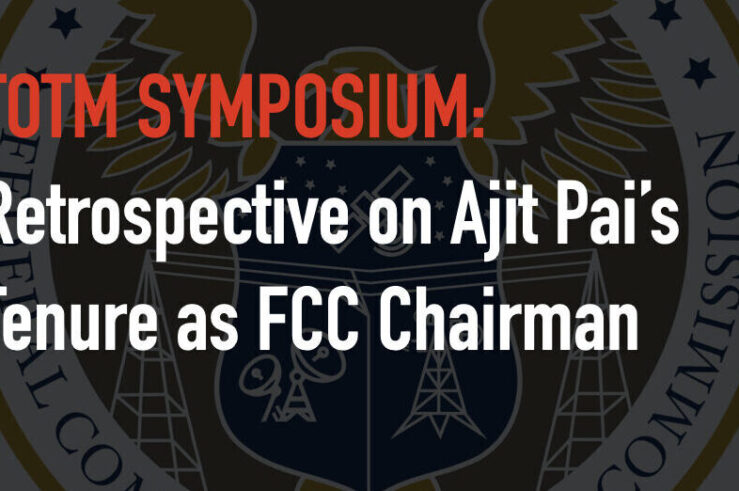Showing results for: “digital markets act”
Great Job, Kid! (And Welcome to the Private Sector)
Many thanks to Geoffrey Manne for this opportunity to memorialize a few thoughts I have about Ajit’s service on the Federal Communications Commission. My remarks will be more about Ajit as a person rather than the substance and long laundry list of his accomplishments as chair. Others will do that, I’m sure. The first memory ... Great Job, Kid! (And Welcome to the Private Sector)
Can Experts Structure Markets? Don’t Count On It.
Complexity need not follow size. A star is huge but mostly homogenous. “It’s core is so hot,” explains Martin Rees, “that no chemicals can exist (complex molecules get torn apart); it is basically an amorphous gas of atomic nuclei and electrons.” Nor does complexity always arise from remoteness of space or time. Celestial gyrations can be ... Can Experts Structure Markets? Don’t Count On It.
Good News for the SEC? Bad News for Markets
The Securities and Exchange Commission (SEC) recently scored a significant win against a Maryland banker accused of naked short-selling. What may be good news for the SEC is bad news for the market, as the SEC will now be more likely to persecute other alleged offenders of naked short-selling restrictions. “Naked” short selling is when ... Good News for the SEC? Bad News for Markets
Markets and art
We often seem to assume that market competition is inconsistent with great art. In fact this is not true. People like good art, especially rich people, and therefore will pay for it. Consider, for example, the state of movies and television today. Edward Jay Epstein (HT MR) notes that while subscription television has had turn to ... Markets and art
Antitrust Fallacies of Fact and Theory
Steve Hurwitz as a characteristically thoughtful and provocative post over at Austrian Economists on identifying the most dangerous fallacies of fact and theory in economics that a reasonably informed layperson would believe. Steve’s nominations are that the average person believes that the “economic well-being of the average American is on the decline” (fallacy of fact) ... Antitrust Fallacies of Fact and Theory
Overcriminalization in action: the FCPA
I have written about the problems of criminalizing corporate agency costs and the intersection between these agency costs and the agency costs of the government agents who prosecute the crimes. Joe Yockey, in his recent paper Solicitation, Extortion, and the FCPA, shows that Foreign Corrupt Practices Act prosecutions provide a particularly acute illustration of these ... Overcriminalization in action: the FCPA
Searle Center Preliminary Report on State Consumer Protection Acts
The Searle Center Civil Justice Institute has announced the release of its preliminary report on State Consumer Protection Acts: An Empirical Investigation of Private Litigation. You can read the Executive Summary here. As the Searle Center State Consumer Protection Acts Task Force Chair, I’ve been involved in the data collection, analysis, and drafting of this ... Searle Center Preliminary Report on State Consumer Protection Acts
Why the Affordable Care Act, as Construed by the Supreme Court, Will Fail
I’ve recently posted to SSRN a new paper with the same name as this post. The paper asserts, in greater detail, a number of points I’ve previously made on TOTM: Health insurance premiums will rise under the (SCOTUS-modified) ACA, because the Act’s “guaranteed issue” and “community rating” mandates will generate widespread adverse selection that cannot be ... Why the Affordable Care Act, as Construed by the Supreme Court, Will Fail
Welcome Digitopoly!
This looks like a great new blog on economics and technology from a top notch group of economists: Erik Brynjolfsson, Joshua Gans and Shane Greenstein. Welcome Digitopoly. Now added to the blogroll. Here’s their description of the blog: This blog was established by Professors Erik Brynjolfsson, Joshua Gans and Shane Greenstein. They noticed that there ... Welcome Digitopoly!
The FTC’s Pre-Acquisition Review Requirement for All Meta Deals: Hyper-Regulatory, Anti-Free Market, Anti-Rule of Law, and Anti-Consumer
The Federal Trade Commission (FTC) wants to review in advance all future acquisitions by Facebook parent Meta Platforms. According to a Sept. 2 Bloomberg report, in connection with its challenge to Meta’s acquisition of fitness-app maker Within Unlimited, the commission “has asked its in-house court to force both Meta and [Meta CEO Mark] Zuckerberg to ... The FTC’s Pre-Acquisition Review Requirement for All Meta Deals: Hyper-Regulatory, Anti-Free Market, Anti-Rule of Law, and Anti-Consumer
Let The Music Play: Critics Of Universal-EMI Merger Are Singing Off-Key
There are a lot of inaccurate claims – and bad economics – swirling around the Universal Music Group (UMG)/EMI merger, currently under review by the US Federal Trade Commission and the European Commission (and approved by regulators in several other jurisdictions including, most recently, Australia). Regulators and industry watchers should be skeptical of analyses that ... Let The Music Play: Critics Of Universal-EMI Merger Are Singing Off-Key
Why Technological Neutrality Is Key to BEAD’s Success
Congress intended the Infrastructure Investment and Jobs Act’s (IIJA) ambitious $42.5 billion Broadband Equity, Access, and Deployment (BEAD) program to bridge America’s digital divide by subsidizing infrastructure buildout to areas that are either unserved or underserved by broadband internet. With projects administered by the 50 states, five insular territories, and the District of Columbia, the ... Why Technological Neutrality Is Key to BEAD’s Success








